定语从句
(完整版)定语从句详解+例句
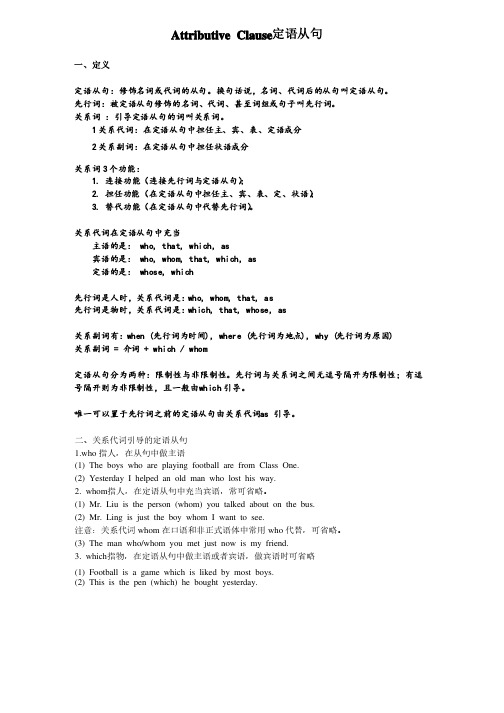
Attributive Clause定语从句一、定义定语从句:修饰名词或代词的从句。
换句话说,名词、代词后的从句叫定语从句。
先行词:被定语从句修饰的名词、代词、甚至词组或句子叫先行词。
关系词:引导定语从句的词叫关系词。
1关系代词:在定语从句中担任主、宾、表、定语成分2关系副词:在定语从句中担任状语成分关系词3个功能:1. 连接功能(连接先行词与定语从句);2. 担任功能(在定语从句中担任主、宾、表、定、状语);3. 替代功能(在定语从句中代替先行词)。
关系代词在定语从句中充当主语的是: who, that, which, as宾语的是: who, whom, that, which, as定语的是: whose, which先行词是人时,关系代词是:who, whom, that, as先行词是物时,关系代词是:which, that, whose, as关系副词有:when (先行词为时间), where (先行词为地点), why (先行词为原因)关系副词 = 介词 + which / whom定语从句分为两种:限制性与非限制性。
先行词与关系词之间无逗号隔开为限制性;有逗号隔开则为非限制性,且一般由which引导。
唯一可以置于先行词之前的定语从句由关系代词as 引导。
二、关系代词引导的定语从句1.who指人,在从句中做主语(1) The boys who are playing football are from Class One.(2) Yesterday I helped an old man who lost his way.2. whom指人,在定语从句中充当宾语,常可省略。
(1) Mr. Liu is the person (whom) you talked about on the bus.(2) Mr. Ling is just the boy whom I want to see.注意:关系代词whom在口语和非正式语体中常用who代替,可省略。
(完整版)定语从句归纳

定语从句(the attributive clause )一.什么叫定语从句?一个句子作定语就叫定语从句。
二.定语从句的结构及种类1. 结构:关系词 +主语+谓语+其它2. 种类:限制性定语从句和非限制性定语从句三.关系词的分类及关系词1.关系代词: who ,whom, whose, that ,which, as2.关系副词: when ,where ,why四.关系词的功用1.起连接作用,引导定语从句2.在定语从句中作一个成分——主语,宾语,状语,定语,表语。
五.什么是先行词?被定语从句所修饰的词是先行词。
六.关系词的用法1.who当先行词是指人得名词或代词,而且关系词在句中作主语时,选who 。
The boy who is standingover there is Tom.He who doesn ’t reach the Great Wall is not a true man.2.whom当先行词是指人得名词,而且关系词在句中作主语时,选w h o m.This is our English teacher whom everybody likes.3.whose①当先行词是指人的名词,而且关系词在句中作定语时,选whose. This is my deskmate whose father works in a factory.②当先行词是指物的名词,而且关系在句中作定语时,选whose.We study in a classroom whose windows face to the south.4.that①当先行词是指物的名词,关系词在句中作主语时,选that.This is a machine that can walk.②当先行词是指物的名词,关系词在句中作宾语时,选that. 另外,that 可以省略。
I like the present (that) my father sent me.③当先行词是指人的名词,关系词也可选用that=whoThe boy that/who is playing football on the play ground is my brother.5.which当先行词是指物的名词时,关系词也可选用which ,它在句中作主语或宾语,which=that6.下列情况下,关系词只能选用that①当先行词为不定代词something, anything, nothing, everything 时Is there anything that I can do for you?②当先行词为不定代词all 时Mr. Li does all that he can to do his work well.③ 当先行词被 all, some, any 修饰时These are all the things that I have done today.④当先行词被the only, the very 修饰时This is the only computer that he often turns to for help.⑤ 当先行词被序数词,形容词最高级修饰时This is the cleaning room that you can see here.⑥time 作先行词,前面有序数词或last 修饰时This is the last time that I ’ll give y oupocket m o n e y.⑦ 尽管先行词指人,但关系词在句中作表语时。
定语从句详解(很全)
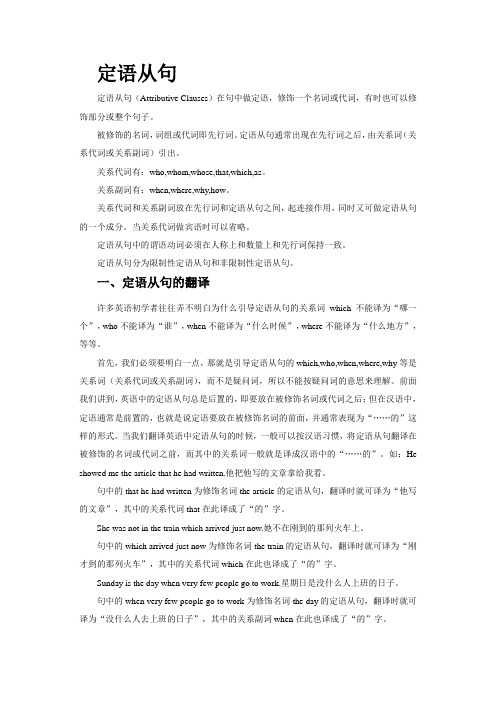
定语从句定语从句(Attributive Clauses)在句中做定语,修饰一个名词或代词,有时也可以修饰部分或整个句子。
被修饰的名词,词组或代词即先行词。
定语从句通常出现在先行词之后,由关系词(关系代词或关系副词)引出。
关系代词有:who,whom,whose,that,which,as。
关系副词有:when,where,why,how。
关系代词和关系副词放在先行词和定语从句之间,起连接作用,同时又可做定语从句的一个成分。
当关系代词做宾语时可以省略。
定语从句中的谓语动词必须在人称上和数量上和先行词保持一致。
定语从句分为限制性定语从句和非限制性定语从句。
一、定语从句的翻译许多英语初学者往往弄不明白为什么引导定语从句的关系词which不能译为“哪一个”,who不能译为“谁”,when不能译为“什么时候”,where不能译为“什么地方”,等等。
首先,我们必须要明白一点,那就是引导定语从句的which,who,when,where,why等是关系词(关系代词或关系副词),而不是疑问词,所以不能按疑问词的意思来理解。
前面我们讲到,英语中的定语从句总是后置的,即要放在被修饰名词或代词之后;但在汉语中,定语通常是前置的,也就是说定语要放在被修饰名词的前面,并通常表现为“……的”这样的形式。
当我们翻译英语中定语从句的时候,一般可以按汉语习惯,将定语从句翻译在被修饰的名词或代词之前,而其中的关系词一般就是译成汉语中的“……的”。
如:He showed me the article that he had written.他把他写的文章拿给我看。
句中的that he had written为修饰名词the article的定语从句,翻译时就可译为“他写的文章”,其中的关系代词that在此译成了“的”字。
She was not in the train which arrived just now.她不在刚到的那列火车上。
定语从句归纳
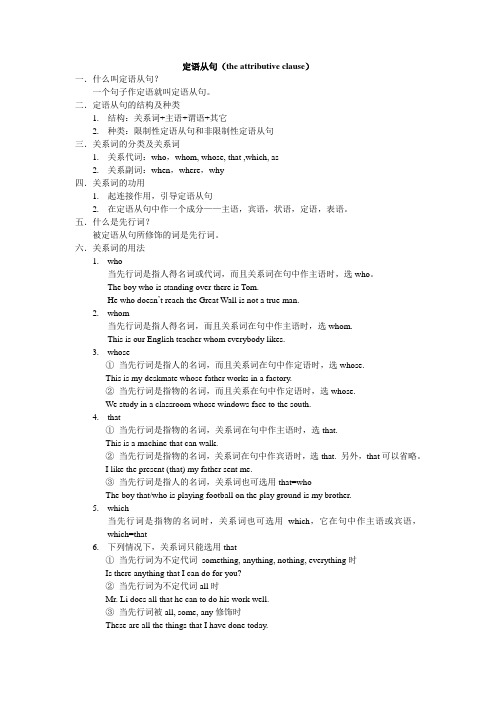
定语从句(the attributive clause)一.什么叫定语从句?一个句子作定语就叫定语从句。
二.定语从句的结构及种类1.结构:关系词+主语+谓语+其它2.种类:限制性定语从句和非限制性定语从句三.关系词的分类及关系词1.关系代词:who,whom, whose, that ,which, as2.关系副词:when,where,why四.关系词的功用1.起连接作用,引导定语从句2.在定语从句中作一个成分——主语,宾语,状语,定语,表语。
五.什么是先行词?被定语从句所修饰的词是先行词。
六.关系词的用法1.who当先行词是指人得名词或代词,而且关系词在句中作主语时,选who。
The boy who is standing over there is Tom.He who doesn’t reach the Great Wall is not a true man.2.whom当先行词是指人得名词,而且关系词在句中作主语时,选whom.This is our English teacher whom everybody likes.3.whose①当先行词是指人的名词,而且关系词在句中作定语时,选whose.This is my deskmate whose father works in a factory.②当先行词是指物的名词,而且关系在句中作定语时,选whose.We study in a classroom whose windows face to the south.4.that①当先行词是指物的名词,关系词在句中作主语时,选that.This is a machine that can walk.②当先行词是指物的名词,关系词在句中作宾语时,选that. 另外,that可以省略。
I like the present (that) my father sent me.③当先行词是指人的名词,关系词也可选用that=whoThe boy that/who is playing football on the play ground is my brother.5.which当先行词是指物的名词时,关系词也可选用which,它在句中作主语或宾语,which=that6.下列情况下,关系词只能选用that①当先行词为不定代词something, anything, nothing, everything时Is there anything that I can do for you?②当先行词为不定代词all时Mr. Li does all that he can to do his work well.③当先行词被all, some, any修饰时These are all the things that I have done today.④当先行词被the only, the very 修饰时This is the only computer that he often turns to for help.⑤当先行词被序数词,形容词最高级修饰时This is the cleaning room that you can see here.⑥time 作先行词,前面有序数词或last修饰时This is the last time that I’ll give you pocket money.⑦尽管先行词指人,但关系词在句中作表语时。
定语从句讲解(完整版)
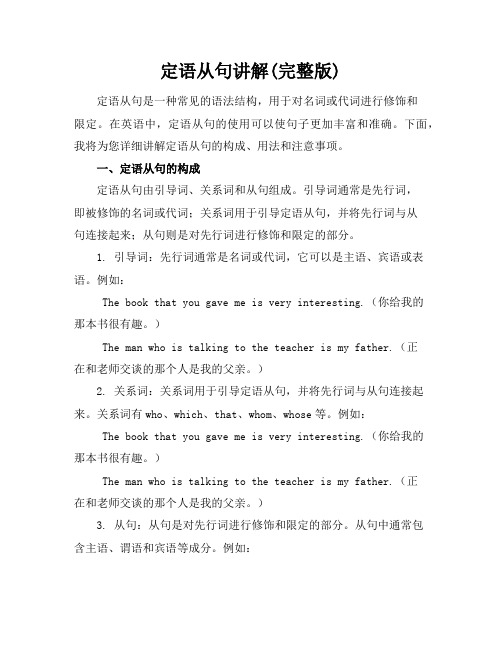
定语从句讲解(完整版)定语从句是一种常见的语法结构,用于对名词或代词进行修饰和限定。
在英语中,定语从句的使用可以使句子更加丰富和准确。
下面,我将为您详细讲解定语从句的构成、用法和注意事项。
一、定语从句的构成定语从句由引导词、关系词和从句组成。
引导词通常是先行词,即被修饰的名词或代词;关系词用于引导定语从句,并将先行词与从句连接起来;从句则是对先行词进行修饰和限定的部分。
1. 引导词:先行词通常是名词或代词,它可以是主语、宾语或表语。
例如:The book that you gave me is very interesting.(你给我的那本书很有趣。
)The man who is talking to the teacher is my father.(正在和老师交谈的那个人是我的父亲。
)2. 关系词:关系词用于引导定语从句,并将先行词与从句连接起来。
关系词有who、which、that、whom、whose等。
例如: The book that you gave me is very interesting.(你给我的那本书很有趣。
)The man who is talking to the teacher is my father.(正在和老师交谈的那个人是我的父亲。
)3. 从句:从句是对先行词进行修饰和限定的部分。
从句中通常包含主语、谓语和宾语等成分。
例如:那本书很有趣。
)The man who is talking to the teacher is my father.(正在和老师交谈的那个人是我的父亲。
)二、定语从句的用法1. 限定性定语从句:限定性定语从句对先行词起到限定作用,即只有满足定语从句条件的名词或代词才是先行词的准确含义。
限定性定语从句通常紧跟在先行词之后,且不能用逗号与主句隔开。
例如: The book that you gave me is very interesting.(你给我的那本书很有趣。
定语从句
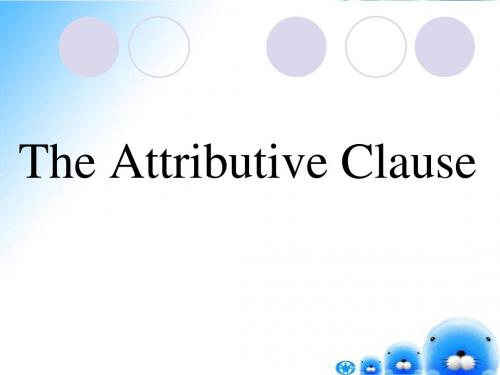
关系词的选择依据在从句中所做的成 分,先行词在从句中做主、定、宾语
时,选择关系代词 (who, whom, that,
which, whose); 先行词在从句中做
状语时,应选择关系副词 ( where地
点状语,when时间状语,why原因状
语) 。
I can’t forget the days which _______ / that I spent in the army.
that 指人/物,作主语或宾语 (作宾语可省 略) A plane is a machine. It can fly. A plane is a machine that can fly. He is the man. I told you about him. He is the man (that) I told you about.
The Attributive Clause
1. 什么是定语从句? 2. 定语从句的关系词有哪些? 3. 如何判断使用关系代词还是关系副词? 4. 在什么情况下定语从句中关系代词只能 用that不用which?什么情况下不用that? 5. 什么是限定性定语从句?什么是非限定 性定语从句? 6. as引导的定语从句如何使用?
5. 先行词被the only, the very, the last等修饰时。 如: Mary is the only friend (that) I have in Australia. 玛丽是我在澳大利亚唯一的朋友。 She is the very thief (that) the policeman is looking for. 她就是警察正在寻找的那个小偷。 The last place they visited was the Summer Palace. 他们最后参观的地方是颐和园。
定语从句的结构和特点

定语从句的结构和特点1. 定语从句的定义和作用定语从句是指修饰一个名词或代词的从句,用来进一步说明或限制该名词或代词的含义。
它通常用来为句子中的某一成分提供额外的信息,起到修饰或限定的作用。
2. 定语从句的结构定语从句一般由关系代词或关系副词引导。
常用的关系代词有:that, who, whom, whose, which等;常用的关系副词有:where, when, why等。
定语从句的结构一般为:关系代词/关系副词 + 主语 + 谓语 +其他成分。
3. 定语从句的特点(1)修饰范围:定语从句通常修饰名词或代词,限定或补充其含义。
(2)位置:定语从句可以位于被修饰词前面或后面,但通常位于被修饰词之后。
当定语从句位于被修饰词之前时,关系代词或关系副词在从句中常常作为它的主语、宾语或表语。
(3)语法性质:定语从句在句中充当一个整体修饰成分,相当于一个形容词或副词,不论在主句中扮演什么角色,其整个过程可看作是一个名词的修饰过程,形成一个复合句。
(4)引导词的选择:关系代词和关系副词的选择要根据具体的语境和语义需求来决定。
(5)省略:当定语从句中的关系代词在从句中作宾语时,且从句的主语与主句的主语一致时,常可省略关系代词。
4. 定语从句的例子以下是一些比较常见的定语从句的例子:- The book that I bought yesterday is very interesting.- The place where I grew up is a small town.- The reason why he resigned is still unknown.- The car whose color is red belongs to my friend.以上就是定语从句的结构和特点的简要介绍。
通过掌握定语从句的基本规则和用法,我们可以更准确地表达自己的意思,并丰富句子的信息内容。
定语从句(完整版)

定语从句(完整版)定语从句是用关系代词或关系副词引导的从句,它的作用是修饰主句中的名词性成分,相当于形容词。
关系词包括关系代词和关系副词,常用的关系代词有that、which、who、whom、whose、as等,而关系副词则有where、when、why等。
关系词有三个作用,即引导定语从句、代替先行词、在定语从句中担当一个成分。
需要注意的是,关系代词有主语和宾语之分,其中whom通常作为宾语。
定语是用来限定、修饰名词或代词的,它可以由形容词、名词、代词、数词、分词、副词、不定式以及介词短语来担任,甚至可以由一个句子来担任。
在汉语中,我们通常用“……的”表示定语。
单词作定语时通常放在它所修饰的词之前,作前置定语;而短语和从句作定语时则放在所修饰的词之后,作后置定语。
被定语从句修饰的名词或代词称为先行词。
限定性定语从句有两种形式,一种是由关系代词引导的,另一种是由关系副词引导的。
关系代词that既可代表事物也可代表人,which则只能代表事物。
在从句中,that和which可以作主语或宾语,而that在从句中作宾语时常常可以省略关系词。
如果which在从句中作“不及物动词+介词”的介词的宾语,注意介词不要丢掉,而且介词总是放在关系代词which的前面,但有些例外。
需要注意的是,代表物时多用which,但在带有特定词语的句子中,如anything、everything、nothing、none等不定代词时,或者是由every、any、all、some、no、little、few、much等修饰时,应该使用that而不是which。
此外,当先行词前有序数词或形容词最高级修饰时,或先行词就是序数词或最高级时,或者先行词中既有人又有物时,也应该使用that,而不是which。
4.Who and whom are used to introduce clauses that modify people。
serving as the subject and object of the clause respectively。
定语从句

5. I told the story to Tom, who later told it to John. 6. Mr. White, whose home is not far from here, is a doctor. 7. In the old days, when I was a little boy, the city has no industry to speak of.
当定语从句与被修饰词关系密切时,则用限制性定语从句。 1. 引导定语从句的关系代词
1) who 指人,作从句的主语或宾语。 This is the professor who teaches us chemistry. The boys who are playing football on the playground are my classmates. 2) whom 指人,只作从句的宾语。 The man (whom) you met in the street yesterday is our English teacher. This is the girl (whom) you have been looking for. 3) whose 指人或物,在从句中作定语。 The girl whose father is our history teacher is a good singer.
1. Some of the roads were flooded, which made our journey more difficult.
2. He has smoothly entered a key middle school, which makes his parents very happy. 3. Mr King, whose legs were badly hurt, was quickly taken to hospital.
定语从句

定语从句(The Attributive Clause)一、概念:在复合句中修饰名词或代词的句子。
定语可以由形容词、代词、数词、名词、分词、不定式、介词短语等来担任,修饰名词。
例:The girl behind the tree is Kate.The man driving too fast was drunk.定语从句在英语中,修饰名词或代词的句子叫定语从句。
例:The girl who is behind the tree is Kate.The man who was driving too fast was drunk.关系代词如何引导定语从句普通代词与关系代词的区别I have a sister. She works in Shanghai.普通代词:只起代替的作用I have a sister who/that works in Shanghai.关系代词:1.代替先行词;2.它还在定语从句中担任一定的成分;3.同时连接先行词与它引导的定语从句。
The building is our school.The building stands by the river.The building which/that stands by the river is our school.Which/that是关系代词,它在从句中代替先行词the building,同时担任从句中的主语,也起连词的作用,把两个简单句连接起来。
关系代词的使用取决于先行词,它们的关系非常密切,因为关系代词在定语从句中代替主句中的先行词,所以它在一般情况下都跟在先行词之后,而且它的人称、数必须和先行词一致。
关系词判断步骤:首先,要看先行词。
如果先行词是指人,关系代词可用who, that, whom, whose。
如果先行词指物,关系代词可用which或that。
然后,要确定关系词在从句中的成分。
请看下表。
最后,定语从句谓语动词和先行词一致。
定语从句

定语从句的用法一、定语从句的概念在复合句中,修饰某一名词或代词的从句叫定语从句。
被修饰的名词或代词叫先行词,定语从句一般放在先行词的后面。
The man who / that I saw at the school gate yesterday is my English teacher.昨天我在校门口看见的那个人是我的英语老师。
二、定语从句的关系词引导定语从句的关系词有关系代词和关系副词,常见的关系代词包括that, which, who(宾格whom,所有格whose)等,关系副词where, when, why等。
关系代词和关系副词放在先行词及定语从句之间起连接作用,同时又作定语从句的重要成分。
①I am waiting for the boy who /that is wearing a red coat. (关系代词作主语)我正在等穿着红色外套的那个男孩。
②The dictionary that / which my sister gave me last Sunday is very expensive. (关系代词作宾语)我姐姐上周星期天给我的那本字典很贵。
③The woman whose name is Linda Brown is his mother. (关系代词作定语)那个是他的母亲,名叫琳达•布朗。
④That is the house where my father used to live. (关系代词作状语)那是我父亲曾经居住过的房子。
三、关系代词的用法1. that 既可以用于指人,也可以用于指物。
在从句中作主语或宾语,作主语时不可省略,作宾语时可省略。
例如:① Mary likes music that is quiet and gentle. 玛丽喜欢轻柔的音乐。
(that作主语)② The coat (that) I put on the desk is blue.我放在桌子上的那件外套是蓝色的。
五个简单的定语从句
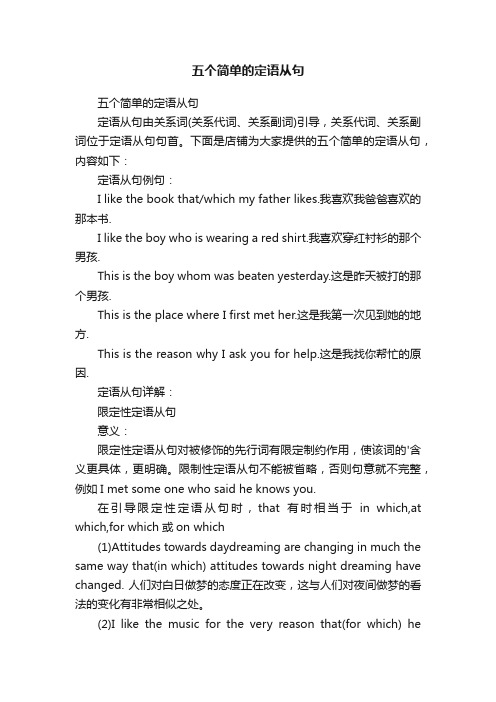
五个简单的定语从句五个简单的定语从句定语从句由关系词(关系代词、关系副词)引导,关系代词、关系副词位于定语从句句首。
下面是店铺为大家提供的五个简单的定语从句,内容如下:定语从句例句:I like the book that/which my father likes.我喜欢我爸爸喜欢的那本书.I like the boy who is wearing a red shirt.我喜欢穿红衬衫的那个男孩.This is the boy whom was beaten yesterday.这是昨天被打的那个男孩.This is the place where I first met her.这是我第一次见到她的地方.This is the reason why I ask you for help.这是我找你帮忙的原因.定语从句详解:限定性定语从句意义:限定性定语从句对被修饰的先行词有限定制约作用,使该词的'含义更具体,更明确。
限制性定语从句不能被省略,否则句意就不完整,例如I met some one who said he knows you.在引导限定性定语从句时,that有时相当于in which,at which,for which或on which(1)Attitudes towards daydreaming are changing in much the same way that(in which) attitudes towards night dreaming have changed. 人们对白日做梦的态度正在改变,这与人们对夜间做梦的看法的变化有非常相似之处。
(2)I like the music for the very reason that(for which) hedislike it. 我出于某种原因喜欢这种音乐,而他恰恰与我相反。
(3)We arrived the day that(on which) they left. 刚好我们到的那天他们走了。
定语从句的用法和例句
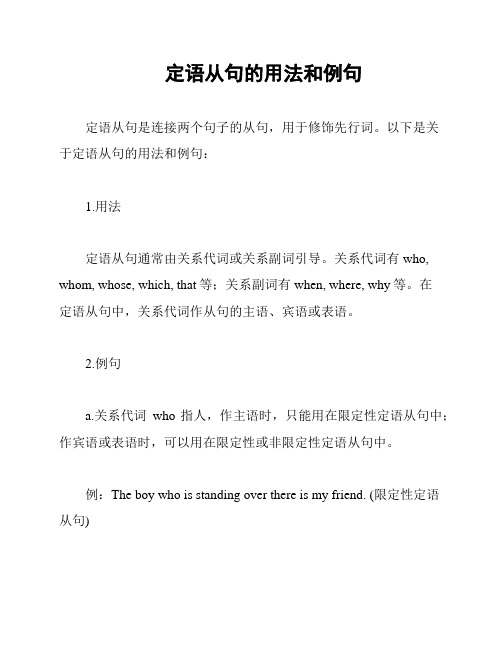
定语从句的用法和例句定语从句是连接两个句子的从句,用于修饰先行词。
以下是关于定语从句的用法和例句:1.用法定语从句通常由关系代词或关系副词引导。
关系代词有who, whom, whose, which, that等;关系副词有when, where, why等。
在定语从句中,关系代词作从句的主语、宾语或表语。
2.例句a.关系代词who指人,作主语时,只能用在限定性定语从句中;作宾语或表语时,可以用在限定性或非限定性定语从句中。
例:The boy who is standing over there is my friend. (限定性定语从句)b.关系代词which指物,作主语、宾语或表语时,都可以用在限定性定语从句或非限定性定语从句中。
例:I like the book which you lent me. (限定性定语从句)c.关系副词when和where在定语从句中分别表示时间和地点,在限定性定语从句中只能用在修饰时间和地点的先行词。
例:I still remember the day when I met him for the first time. (限定性定语从句)3.注意事项a.关系代词that既可以引导限定性定语从句,也可以引导非限定性定语从句。
但在口语和非正式写作中,往往省略。
例:The book (that) you borrowed from me is very interesting.b.在定语从句中,先行词一定要出现在从句中。
如果先行词是句子中的一部分,通常要用关系副词引导定语从句。
例:He still remembers the place where he spent his childhood. (where引导修饰place的定语从句)以上是关于定语从句的简单介绍,希望能帮助你更好地理解和掌握这一语法结构。
定语从句

同时还要重视“复杂介词或代词”出现时与并列句的区别。如: He loved his parents deeply, both of whom are very kind to him. (定 语从句) He loved his parents deeply and both of them are very kind to him. (并列句) 此外,“介词+which+名词”结构,也是一个较为特殊的结构。如: He was very ill, in which case (=and in this case) we sent him to hospital first.
五、特殊先行词后的定语从句 1. 先行词是reason 时,如果关系词在从句中作状语,用 why或for which 引导;关系词在从句中作主语、宾语或 表语,用that或which引导。如: The reason why / for which so many people caught the disease is still not ar.
2. 关系代词which与as which 和as 都可引导非限制性定语从句,用来指代整个主句或主 句的一部分。通常which 引导的从句放在句末,而as 引导的从句 既可位于句首,又可位于句中或句末。如: As is known to all, smoking is harmful to one's health. Frank, as might be expected, was attending the conference. We thought him a gentleman, as / which he could never be.
5. 考查“介词+关系代词”引导的定语从句。“介词+关系代词”引 导的定语从句,关系代词指人时用whom,指物时用which,不能用 that。关系代词作定语时也可用whose。如: The teacher in front of whose house stands a tall tree is very patient with his students.
定语从句定义和用法

定语从句定义和用法定语从句是英语语法中的一个重要部分,它可以用来修饰名词或代词,进一步说明其特征或属性。
在英语中,定语从句的使用非常广泛,几乎在每个句子中都可以看到它的身影。
本文将从定义、用法、结构和注意事项等方面详细介绍定语从句。
一、定义定语从句是指用来修饰名词或代词的从句,它通常由关系代词或关系副词引导,用来进一步说明名词或代词的特征或属性。
定语从句通常放在被修饰的名词或代词后面,起到进一步说明的作用。
二、用法1. 修饰名词或代词定语从句的主要作用是修饰名词或代词,进一步说明其特征或属性。
例如:- The book that I bought yesterday is very interesting.(我昨天买的那本书非常有趣。
)- The girl who is standing over there is my sister.(站在那边的女孩是我的妹妹。
)2. 用来缩短句子定语从句可以用来缩短句子,使句子更加简洁明了。
例如:- The man who is wearing a hat is my father.(戴帽子的那个人是我父亲。
)- The car that I bought last year is very expensive.(我去年买的那辆车非常贵。
)3. 用来强调定语从句也可以用来强调某个名词或代词,使其更加突出。
例如:- It was the book that I bought yesterday that made me laugh.(正是我昨天买的那本书让我笑了。
)- It was the girl who is standing over there that I saw yesterday.(昨天我看到的就是站在那边的女孩。
)三、结构定语从句通常由关系代词或关系副词引导,关系代词包括who、whom、whose、which和that,关系副词包括when、where和why。
完整版)定语从句详解+例句

完整版)定语从句详解+例句定语从句是修饰名词或代词的从句。
也就是说,名词或代词后面的从句就是定语从句,而被定语从句修饰的名词、代词、甚至词组或句子叫做先行词。
引导定语从句的词叫做关系词,其中包括关系代词和关系副词。
关系代词在定语从句中可以担任主语、宾语、表语、定语和状语等多种语法成分,而关系副词则可以担任状语成分。
关系代词在定语从句中充当主语的有who、that、which和as;在定语从句中充当宾语的有who、whom、that、which和as;在定语从句中充当定语的有whose和which。
当先行词是人时,关系代词可以是who、whom、that和as;当先行词是物时,关系代词可以是which、that、whose和as。
关系副词有when(先行词为时间)、where(先行词为地点)和why (先行词为原因),它们是介词和which/whom的组合。
定语从句分为限制性和非限制性两种。
当先行词与关系词之间没有逗号隔开时,就是限制性定语从句;而当先行词与关系词之间有逗号隔开时,就是非限制性定语从句,而且一般由which引导。
唯一可以置于先行词之前的定语从句由关系代词as引导。
关系代词who指人,在定语从句中充当主语;而whom 指人,在定语从句中充当宾语,常常可以省略。
关系代词which指物,在定语从句中可以充当主语或宾语,而它在充当宾语时可以省略。
需要注意的是,口语和非正式语体中,关系代词whom常常可以用who代替,并且可以省略。
XXX.This is the pen he XXX.When referring to a person。
"that" can be used in place of "who" or "whom" in object clauses。
and can be omitted.The number of visitors to the city increases by one n each year.Where is the man I saw this morning?XXX used to refer to people。
定语从句用法(含例句及解析)

定语从句---关系代词的用法一、定语从句概述1.定义:在复合句中修饰某一名词或代词的从句,叫定语从句。
它所修饰的名词或代词叫先行词。
2.构成:先行词+关系词+定语从句关系词作用:连接主句和从句; 指代先行词; 在从句中充当句子成分。
3.分类:限制性定语从句、非限制性定语从句。
4.关系词关系代词: that, which, who, whom, whose, as关系副词: when, where, why关系代词的具体用法见下表:关系代词先行词在从句中所做的成分that 人、物主语、宾语、表语which 物主语、宾语who 人主语、宾语whom 人宾语whose 人、物定语as 人、物主语、宾语、表语二、关系代词的用法1. that指人也可指物, 在定语从句中可作主语、宾语或表语,作宾语时可省略。
The number o f people that come to visit this city each year re ache s one million.每年来游览这座城市的人的数量达到了100万。
(指人, 作主语)This is the suitcase (that) she is lo o king fo r.这就是他在找的那个手提箱。
(指物, 作宾语)2. which指物,在定语从句中可作主语或宾语,作宾语时可省略。
They ignored the details which might account for the accident.他们忽略了那些或许可以解释事故发生原因的细节。
(作主语)3.who指人, 在定语从句中可作主语或宾语,作宾语时可省略。
We are concerned about people who have suffered a lot in the earthquake.我们为在地震中遭受重创的人们担心。
(作主语)Danny was the man (who) we rescued from the ruins.丹尼正是我们从废墟中救出来的那个人。
定语从句的用法归纳总结
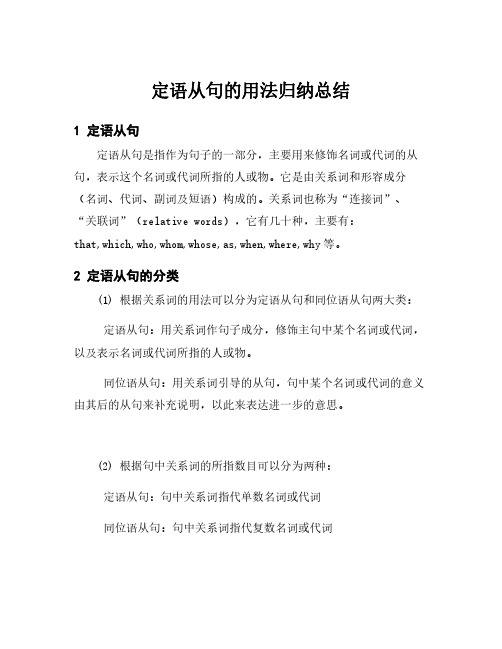
定语从句的用法归纳总结1定语从句定语从句是指作为句子的一部分,主要用来修饰名词或代词的从句,表示这个名词或代词所指的人或物。
它是由关系词和形容成分(名词、代词、副词及短语)构成的。
关系词也称为“连接词”、“关联词”(relative words),它有几十种,主要有:that,which,who,whom,whose,as,when,where,why等。
2定语从句的分类(1)根据关系词的用法可以分为定语从句和同位语从句两大类:定语从句:用关系词作句子成分,修饰主句中某个名词或代词,以及表示名词或代词所指的人或物。
同位语从句:用关系词引导的从句,句中某个名词或代词的意义由其后的从句来补充说明,以此来表达进一步的意思。
(2)根据句中关系词的所指数目可以分为两种:定语从句:句中关系词指代单数名词或代词同位语从句:句中关系词指代复数名词或代词3定语从句的用法(1)that引导的定语从句:that引导定语从句可以指代人或物,也可以指代抽象概念,如idea、fact等。
有时可以省略that引导的定语从句,但要注意that 引导的定语从句在口语中通常不省略。
(2)which引导的定语从句:which引导的定语从句通常只能指代物,而不能指代人,故不能用来替换who或whom,但可以替换that。
此外,在对话语言中,which 引导的定语从句可以指代人,而且一般不可以省略。
(3)whose引导的定语从句:whose引导的定语从句用以表示某人、某物或某事所属的所有者,常用来替换whoever和whatever,但不能用来替换they。
(4)when/where引导的定语从句:when/where引导的定语从句可以用来表示时间和地点,即问句中的时间和地点。
(5)as/than引导的定语从句:as/than引导的定语从句一般用来比较两个事物,故它们往往出现在类似“as…as”或“not as/so…as”这样的句型中。
- 1、下载文档前请自行甄别文档内容的完整性,平台不提供额外的编辑、内容补充、找答案等附加服务。
- 2、"仅部分预览"的文档,不可在线预览部分如存在完整性等问题,可反馈申请退款(可完整预览的文档不适用该条件!)。
- 3、如文档侵犯您的权益,请联系客服反馈,我们会尽快为您处理(人工客服工作时间:9:00-18:30)。
4) Even young students who plan on staying in the United States just long enough to finish two semesters of high school have difficulty finding a host family. 即使是那些只计划短期留居美国,一完成两学期 高中课程就离开的年轻学生也很难找到一个愿意 收留他们的家庭。
1. 中心词+adj.短语+定语从句 ……完全颠倒
2. 特殊疑问句 ……疑问Prop.+名词 3. 中心词+谓语+定语从句 ……先谓语
4.中心词+prep.短语+定语从句 ……短前长后
5.中心词+2个定语从句 6.中心词+分词结构+定语从句 7.中心词+插入语+定语从句 8.中心词+adv.+定语从句 ……看逻辑主语 9. 中心词+其他成分+定语从句
Examples
2) I want to buy a house which is inexpensive yet comfortable. 我想买一座又便宜又舒适的房子。 3) Now it is proving itself not as a country which is threatened but as a country which is threatening others. 现在证明它自己不是一个受威胁的国家,而 是一个威胁他国的国家。
表“ciples might be helpful for foreign students who wish to increase their reading skill. 外国学生想要提高自己的阅读能力,下列原 则可能有所帮助。 Men become desperate for work, any work, which will help them to keep alive their families. 人们极其迫切地要求工作,不管什么工作,只 要它能维持一家人的生活就行。
表“目的”的定语从句
The
imperialist maitains enormous armies and gigantic navies which are used for oppressing and exploiting the people in distant land. 帝国主义国家维持了庞大的陆海军,用以压 迫和剥削远地的人民。 He is collecting authentic material that proves his argument. 为了证明他的论点,他正在收集确凿的材料。
表“时间”的定语从句
Electricity,
which is passed through the thin tungsten wire inside the bulb, make the wire very hot. 当电通过灯泡里的细钨丝时,钨丝就会变 得很热。 A driver who is driving the bus mustn’t talk with others or be absent-minded. 司机在开车时,不许和人谈话,也不能走 神。
非限制性定语从句
英语的定语从句与汉语中的定语还有一 个不同的地方,那就是,英语中有些定 语从句和主句关系不密切,它从语法上 看是修饰定语从句的先行词的,但实际 上限定作用不强,而是修饰主句的谓语 或全句的,起状语作用。也就是说,有 些定语从句兼有状语从句的职能,在意 义上与主句有状语关系,表明原因、结 果、目的、让步、假设等关系。
But if the attributive clause may cause ambiguity or logic mistake, it should be put after its antecedent, usually as an individual sentence : e.g. They killed four men and injured the fifth who later died of his wounds. 他们打死四人,并打伤了后来伤重死去的第 五人。 他们打死四人,打伤一人, 伤者后来因伤势 过重而死 。
1. 中心词+adj.短语+定语从句 ……完全颠倒
这种结构的,通常用”定语从句+adj.短语+中心词” 结构, 即原来成分完全颠倒过来 --- Snow-white cloth, suitable for making shirts, that is produced in our factory, has been sold out. 我厂生产的适于做衬衣的纯白布匹已经卖完了. --- You remember, that electric charges, positive and negative, which are responsible for electrical forces, can wipe one another out and disappear. 记住,产生电力的正负电荷是能相互抵消并且消失的. 返回
2. 特殊疑问句 ……疑问Pron.+名词
修饰疑问代词Prop.的定语从句有时候被简短的问句隔 开, 这时, 通常将谓语动词放疑问pron.前, 同时在疑 问prop.后加适当名词 ---What do you have that’s good to read? 你有什么好书可看? ---What on earth did you do that was so bad? 你究竟干了什么坏事?
As we have seen in an earlier unit, the greater this difference in temperature, the faster the heat will flow.
正如我们在先前一个单元中所看到的,温差越大,
热传输越快。
分离式定语从句:定语从句和中心词被其他成分分隔开来
定语从句
Attributive Clause
Contents
Restrictive Attributive Clause Non-restrictive Attributive Clause Special Attributive Clause Divided Attributive Clause
老师向学生们表示感谢,因为学生们向老师送了鲜 花。
The
teacher thanked the students who had given her flowers. (含义:部分学生)
老师向给她送鲜花的学生表示感谢。
Tom
got into the car, which parked behind the house.
表示“原因”的定语从 句 The soldiers, who may have felt sorry for the
boy, had him stand with his back to his father. 那些士兵,可能是出于对孩子的怜悯,让他背 向他的父亲站着。 He showed no further wish for conversation with Mrs. Smith, who was now more than usually insolent and disagreeable. 他似乎不愿再和史密斯太太讲话,因为她现在 异常无礼,令人厌烦。
表“让步”的定语从句
The
problem, which is very complicated, has been solved. 这个问题虽然很复杂,但已经解决了。 He insisted on buying another house, which he had no use for. 尽管他并没有这样的需要,他坚持要再买一 幢房子。
汤姆进了汽车, 那辆车停在房子后面。(只一 辆车)
Tom
got into the car which parked behind the house.
汤姆进了停在房子后面的汽车。(不只有一辆 车)
特殊定语从句
由as引导的定语从句,既可以是限制性 的,又可以是非限制性的;既可以修饰 主语或宾语,又可以修饰整个主句,而 且还在从句中充当主语或宾语等句子成 分。因此,我们可把它视为一种特殊定 语从句。
2.并列句
1) it seemed to him that his heart was bound with cords which an unseen hand was tightening with every tick of the clock. 他觉得他的心让许多绳子捆住,有一只看不 见的手跟着钟的滴答声一下一下地把它收紧。
Restrictive Attributive Clause
限制性定语从句一般可以作为前置定语或并 列句。 1.前置定语 1)the people who worked for him lived in mortal fear of him. 在他手下工作的人对他怕得要死。 较短的限制性定语从句往往译成汉语的主谓 词组,放在被修饰词的前面。
2)He managed to raise a crop of 200 tomatoes that weighed up to two pounds each.他居然种出了两百个令人惊奇的西红柿, 每个重达两磅。 3)It is he who received the letter that announced the death of your uncle.是他接到 那封信,说你的叔叔去世了。
